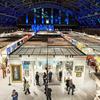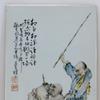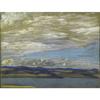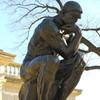Chinese Citizens Rally in Aid of Ai Weiwei to Cover $2.4 Million Tax Bill; His Work On View in New York, Miami, Taipei
- November 04, 2011 14:56
The Chinese government claims influential artist and activist Ai Weiwei owes $2.4 million in back taxes. Thousands of individual Chinese have since sent money to his Internet account to help pay the bill within the ten-day deadline, reports the Christian Science Monitor.
Meanwhile, the Chinese dissident artist---who was jailed for 81 days earlier this year, allegedly for the tax issue---has seen his fame continue to rise, for his political stance, his sudden disappearance after the government arrest, and for a number of international exhibitions of his work.
Now on view, early works by Ai Weiwei (b. 1957) are shown among pieces by other pioneering artists in China from the 1970s and 1980s, at New York City's China Institute Gallery through December 11, 2011. "Blooming in the Shadows: Unofficial Chinese Art, 1974-1985" offers a unique opportunity in the U.S. to witness the artwork created in China during the pivotal decade leading up to the Communist Party’s 1985 decision to allow modern artistic practices.
An exhibition of his art opened Oct. 26 in Taiwan. “Ai Weiwei, Absent” at Taipei’s Fine Arts Museum shows a new work consisting of 1,000 bicycles piled in layers, reflecting his perception of the rapid pace of Chinese social change, according to the Associated Press.
Art Miami, held from Nov. 30 to Dec. 4 in Midtown Miami, will feature Ai Weiwei as part of the 2011 Persol Art Video and New Media Lounge entitled “ZOOOM! Decoding Common Practice.” Curated by Julia Draganovic, the six videos by various artists research the human condition and experiment with the variety of tools that video art provides.
Ai Weiwei’s long video, Chang’an Boulevard, describes the main traffic concourse that crosses the Chinese capital, through fixed, one-minute long shots carried out in 50 meters intervals. Minimal and bereft of aesthetic emphasis, the shots capture the image of a metropolis along with all its inherent contradictions, at the dawn of the controversial urban transformation that overwhelmed the city during the 2008 Olympic Games.
“Ai Weiwei’s work is influential beyond the art sphere and we are so pleased to be able to share it with Art Miami visitors this year,” said curator Julia Draganovic. “His work is extraordinarily engaging and consistently incorporates the theme that freedom of expression is a basic right of any human being.”
In October 2011 ArtReview magazine named Ai Weiwei number one in their annual Power 100 list. Time magazine also included him in its list of the 200 most influential people in the world. WSJ Magazine recently named him "Innovator of the Year" in art.
Ai Weiwei’s work often focuses on the contradictions of modernity, and are always underpinned by a reflection on the nature of power, the forms that it may take and the repercussions it has on the country’s social and cultural life. He is currently confined to Beijing.
His previous major exhibitions include the Uniliver Series 2011 installation at the Tate Modern in London, the Mori Art Museum in Tokyo (2009), the SFMOMA in San Francisco, the IVAM in Valencia (2008) and Documenta in Kassel (2007).






100x100_n.jpg)
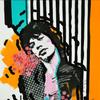
100x100_c.jpg)

